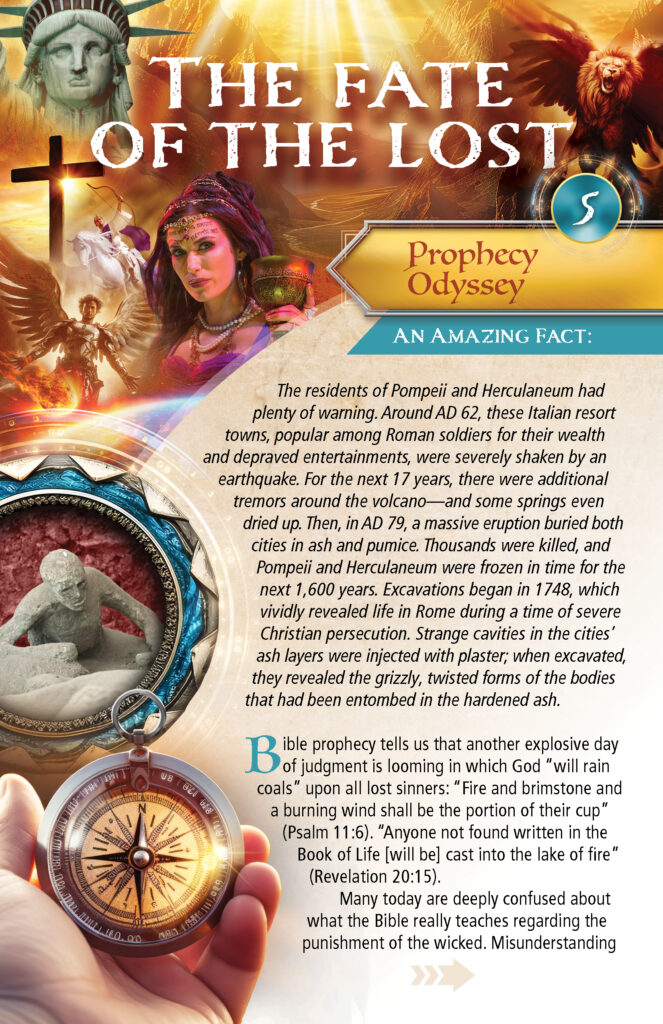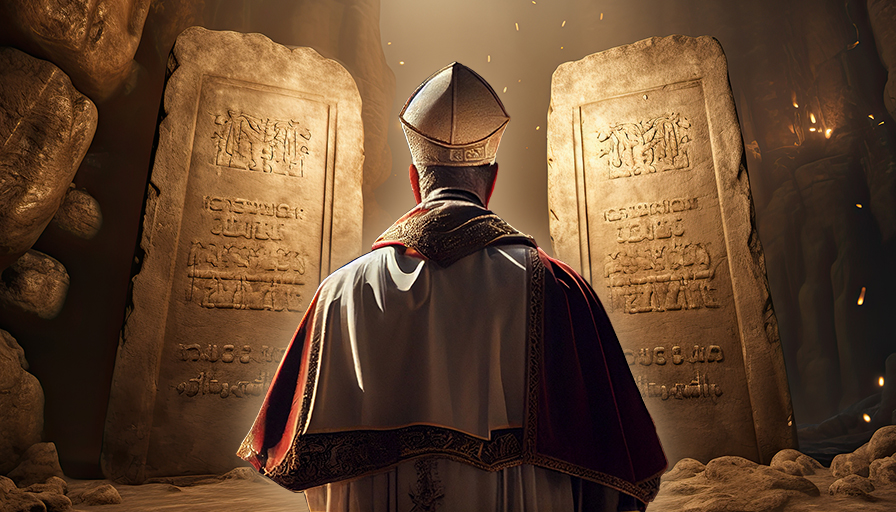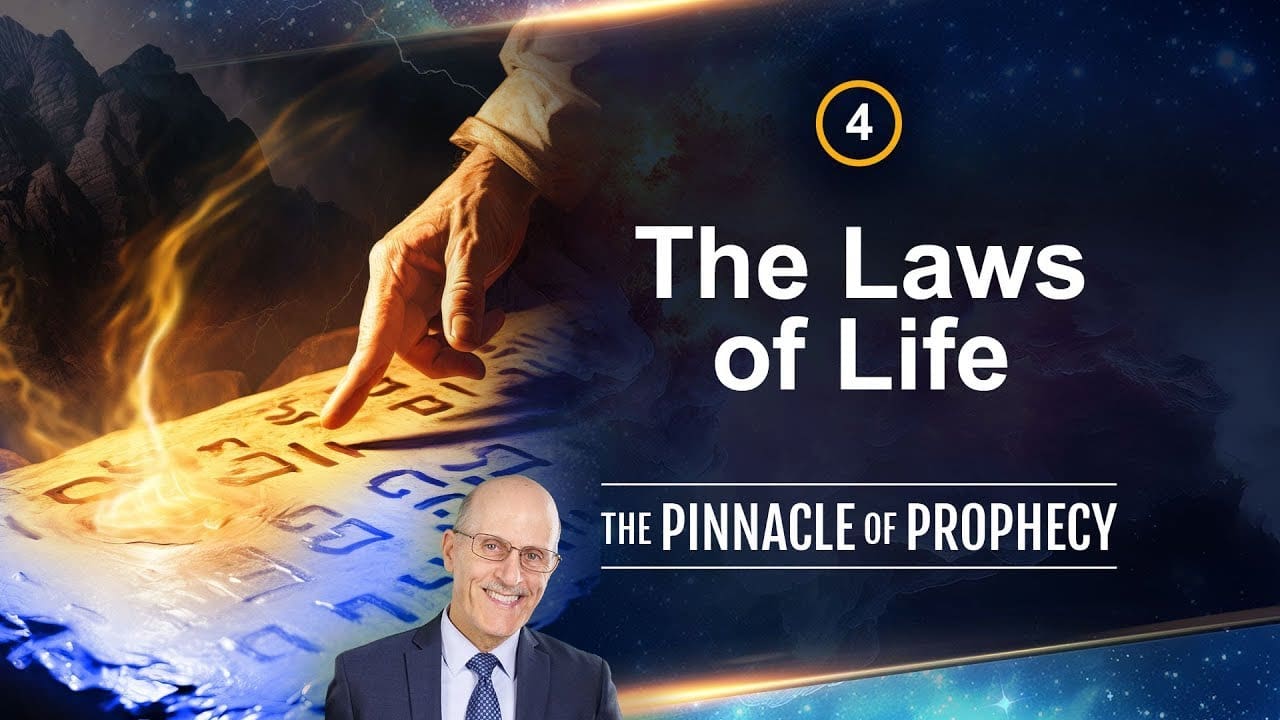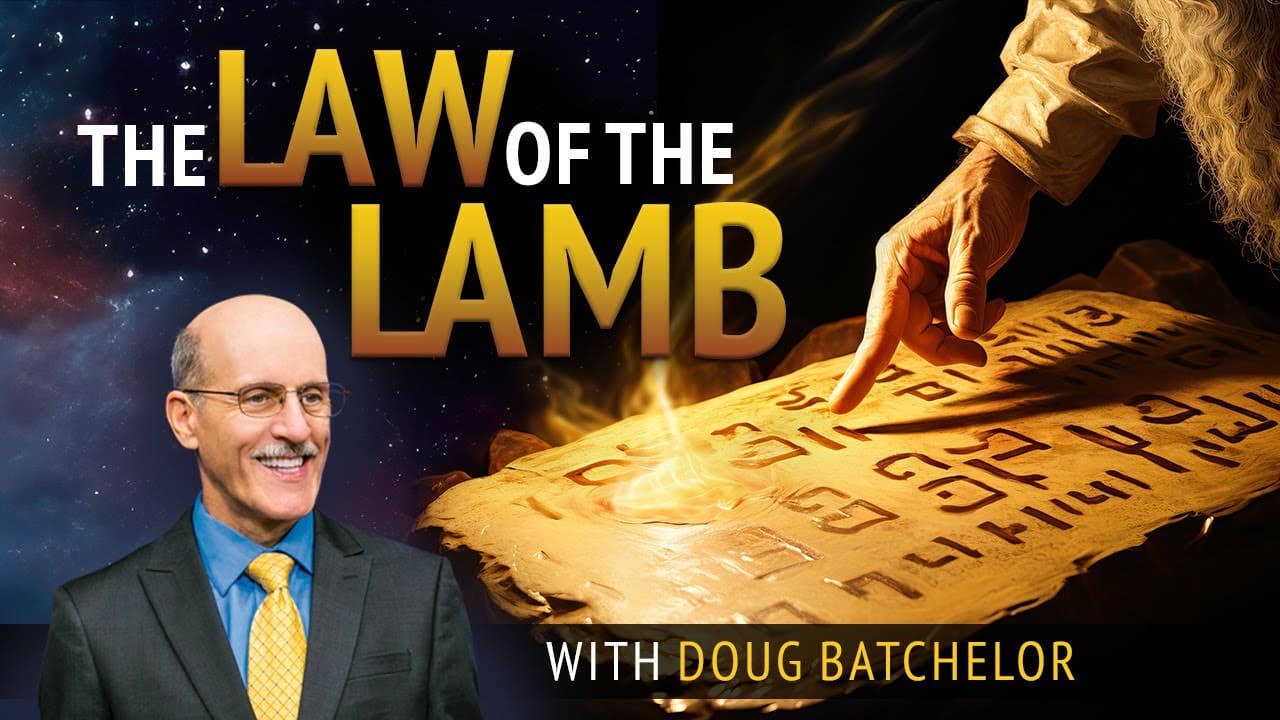The issue of lawlessness and rebellion against God’s law is a problem in our society today. Even in a nation with a Christian heritage like the United States, we witness a steady decline in moral values and an increasing disregard for God’s commandments. Crime, violence, and sinful behaviours have become all too common, causing us to question how we reached this point.
It is sad to see that even within the church, many have adopted a casual attitude towards sin and a diminishing view of the authority of God’s moral law. This attitude has led to a widespread acceptance of sinful lifestyles and behaviours that directly contradict the principles outlined in the Ten Commandments. For example, cohabitation without marriage is now considered acceptable by many, while theft and Sabbath-breaking are downplayed as insignificant transgressions.
This situation is puzzling, especially considering the historical position of Christianity regarding the authority of the Ten Commandments. Most major denominations have officially affirmed their support for the law. However, subtle errors in interpretation have led to confusion and a lack of clear loyalty to God’s commandments within the modern church. It is essential for us to diligently study the Ten Commandments, understand their relationship to God’s grace and salvation, and seek biblical answers to the questions that arise.
One of the key questions we must address is the nature of Christians’ relationship to the law. Are believers completely free from the law? What does it mean to be under the law? Does God’s grace nullify the significance of the Ten Commandments? Is it permissible for a Christian to break any of the commandments based on the understanding of being under grace? These questions require careful examination and a deep dive into the Scriptures to find authoritative answers.
In our study, it is crucial to seek the truth beyond popular clichés or common misconceptions about the relationship between law and grace. We must rely on the biblical facts to shape our understanding and guide our actions. It is only through a comprehensive study of God’s Word that we can gain clarity on these important matters and align our lives with His will.
The reality of facing a death sentence is something most of us cannot fully comprehend. However, we can relate to the guilt and fear that comes from recognizing our own sinfulness when confronted with the truth of God’s Word. The Scriptures declare that the wages of sin is death, and all of us have fallen short of God’s glory.
The weight of these words cannot be underestimated. When we read “all have sinned,” it includes every one of us. It doesn’t matter what our names are; we are all guilty before God’s law. There is no human court that can reverse this sentence and declare us innocent. The fact remains that we are guilty, just as guilty as sin itself. According to the Bible, sin is the transgression of the law, and we must plead guilty for breaking it. Whose law did we break? The Apostle Paul clarifies that it is the great Ten Commandments law, and it demands death as the consequence for transgression.
In our desperation, we search for a way to be justified in the sight of the broken law. How can we avoid the sentence of death? Can we atone for our sins by obeying God’s commandments for the rest of our lives? The answer is clear: “Therefore by the deeds of the law there shall no flesh be justified in his sight.” Works alone cannot justify a soul before God.
Consider the analogy of a criminal sentenced to jail time for theft. By serving the designated time, the person can justify themselves and satisfy the demands of the law. However, if the sentence is death, no amount of work or effort can justify the individual. Even if they were to work endlessly for a hundred years, the law would still demand death. The truth is that “without shedding of blood, there is no remission” of sins. This is why works alone can never save a sinner. The penalty for sin is death, and the law can only be satisfied through the shedding of blood.
The unchanging law with its ruthless death sentence cannot be removed or altered. The guilt of our past sins cannot be erased by future resolutions or good behaviour. We must come to the realization that we owe a debt we cannot pay. The law demands death, and we cannot satisfy it without forfeiting our own eternal life.
This is the desperate situation we find ourselves in as sinners. We need a solution beyond our own works and efforts. We need a Saviour who can meet the demands of the law and provide a way for our sins to be forgiven. Thankfully, God has provided that solution through Jesus Christ, who offered Himself as the sacrificial Lamb to bear the sins of many. Only through His shed blood can our sins be remitted, and our sentence of death be replaced with eternal life.
The question of whether it is necessary to keep the law of God is a crucial one. In Romans 6:1, Paul addresses the concept that grace gives us a license to continue in sin. His response is a resounding “God forbid!” We, who are dead to sin, should not live any longer in it.
In our current age of relativism, it is common for individuals to invent their own definitions that excuse lawbreaking. However, we must not be deceived. The Ten Commandments, which some consider irrelevant and old-fashioned, are just as timely and necessary today as they were when God gave them. Jesus came to magnify the law and reveal its spiritual application, making it even more comprehensive than the legalistic Pharisees could comprehend. Through Christ’s perfect life of obedience, we can see the spiritual details of law-keeping that are only made possible through Him.
It is important to understand what the law cannot do. While it points out sin, it has no power to save us from sin. The works of the law cannot justify or cleanse a person. Salvation comes by grace through faith as a free gift. The purpose of the law is to show us our need for cleansing and to point us to Jesus Christ, the source of true cleansing. The law acts as a mirror, revealing our true selves. Just as a mirror cannot remove a spot from our face, the law cannot cleanse us. Its role is to expose our condition and direct us to the cross for true cleansing.
We cannot earn forgiveness by striving to obey the law. Keeping the law does not earn favour or acceptance with God. The law was not given for the purpose of saving or justifying us; it was given to show us our need for a Saviour. We are saved by grace through faith, not by works. This truth is emphasized throughout the Bible. Countless sincere Christians have mistakenly believed that the Old Testament represents a dispensation of works and the New Testament a dispensation of grace. However, salvation has always been by grace through faith. In both the Old and New Testaments, people were saved by trusting in the merits of the blood of Jesus Christ. The redeemed host throughout eternity will all be sinners saved by grace, exalting the Lamb slain from the foundations of the world.
In summary, the law of God is still binding and relevant today. It exposes our need for salvation and directs us to Jesus Christ for true cleansing. Salvation is by grace through faith, not by works. The entire redeemed host will be united in acknowledging their dependence on God’s grace for salvation.
Some individuals try to dismiss the relevance of the Ten Commandments by focusing on the “new” commandments of love introduced by Christ. While it is true that Jesus summarized the law with the two great commandments of love, these commandments were not new in terms of their origin. Jesus was quoting directly from the Old Testament when He gave those commandments. They were principles that had been forgotten or neglected by the legalists of Christ’s day, but they were not intended to replace the Ten Commandments.
When asked about the greatest commandment, Jesus responded by quoting from the Old Testament, stating that love for God and love for neighbour is the base upon which all the law and the prophets hang. Love fulfills the law, as reiterated by Paul in Romans 13:10. If we truly love God with all our heart, soul, and mind, we will fulfill the first four commandments relating to our duty to God. Likewise, if we love our neighbour as ourselves, we will fulfill the last six commandments relating to our duty to others. Love leads to obedience and the fulfillment of all the law.
There is a common argument that since we are not under the law but under grace, we no longer need to keep the Ten Commandments. However, this argument fails to grasp the true meaning of being under grace. In Romans 6:14, Paul states that we are not under the law but under grace, but he immediately clarifies that this does not give us a license to sin or break the law. Being under grace does not exempt us from the obligation to obey the law. Paul’s intention is to emphasize that being under grace does not mean we can neglect the law. In fact, he strongly warns against using grace as an excuse for lawbreaking.
To understand what it means to be “not under the law,” we need to consider what Paul explains in Romans 3:19. Being under the law means being guilty before God. It implies being under the condemnation of the law due to our guilt and transgressions. Christians, who have found salvation through grace, are no longer under the guilt and condemnation of the law because they are forgiven and justified through Christ. They are under the power of grace instead. Grace empowers them to obey God’s law. The power of grace is greater than the power of sin, enabling believers to live in obedience to God’s commandments.
Using the analogy of a pardoned criminal, we can understand this concept better. When a condemned person receives a full pardon, they are no longer under the law, but under grace. However, this does not grant them permission to break the law. Instead, they are doubly obligated to obey the law as an expression of gratitude for the grace they have received. Similarly, for grace-saved Christians, the law is not nullified or removed; it is established and reinforced in their lives. Faith in Christ’s saving grace does not negate the law but upholds it.
To illustrate further, imagine being stopped by a police officer for speeding, but then receiving a pardon due to a valid emergency. The officer’s pardon does not give you the freedom to continue speeding; it emphasizes the importance of obeying the law and not repeating the offense. Likewise, as followers of Christ, we should not try to rationalize our way out of obeying God’s law. Jesus Himself said, “If you love me, keep my commandments” (John 14:15). Love for God and love for others should compel us to uphold and obey His commandments.
It is a common belief among Christians that since the law is spiritual and we are carnal, no human being can ever fully meet the requirements of the perfect law in this life. However, this belief is not in line with what the Bible teaches. God did not give the law as an impossible goal for us to strive towards but rather as a standard of righteousness that reflects His character and will for our lives.
So, while it is true that no one except Jesus has perfectly obeyed the law, it does not mean that obedience is unattainable for believers. Through faith in Christ and the empowering work of the Holy Spirit, we can strive to live in accordance with God’s commandments and reflect His righteousness in our lives.
The passage from James 2:10-12 emphasizes that breaking even one commandment makes a person guilty of sin and transgression of the entire law. Each of the Ten Commandments represents a moral principle that reveals God’s will for our lives. When we break any one of these commandments, we demonstrate our disobedience to God’s standards of righteousness.
It is important to understand that obedience to the law is not how we earn salvation. Salvation is a gift of God’s grace, received through faith in Jesus Christ. However, our obedience to God’s commandments is a response of love and gratitude for the salvation we have received. Jesus said, “If you love me, keep my commandments” (John 14:15). Genuine love for God will lead us to obey His commandments, not out of legalistic obligation, but out of a desire to honour and please Him.
The illustration of the slave auction highlights the concept of grace and our response to it. We were once held in bondage to sin and death, but Jesus paid the price to set us free. Our response to this act of grace should be one of love and devotion to our Master. We should willingly and joyfully serve Him, not out of fear, but out of deep gratitude for what He has done for us.
The sacrifice of Jesus on the cross demonstrates the unchangeable nature and authority of God’s law. The penalty for sin is death, and that penalty had to be paid. The law could not be abolished or set aside, but rather had to be satisfied. Jesus, in His perfect love and justice, took upon Himself the penalty for our sins, satisfying the requirements of the law. Through His sacrifice, the law was magnified and upheld, demonstrating its eternal validity and God’s unwavering commitment to righteousness.
Therefore, it is vital to recognize the permanence and significance of the Ten Commandments. Belittling or disregarding the law is to misunderstand and disrespect God’s government and His standards of holiness. The law serves as a reflection of God’s character and reveals His expectations for our lives. Instead of trying to meet the requirements of the law in our own strength, we should turn to Jesus, who fulfilled the law perfectly and offers us His enabling power through the indwelling of the Holy Spirit. By faith in Him, we can experience transformation and live according to the righteousness of the law.
Let us humbly acknowledge our inability to meet the perfect standard of the law and rely on the grace and power of Christ to fulfill the righteousness of the law in our lives. May we respond to God’s love and grace with wholehearted devotion and obedience, knowing that our obedience is a fruit of our love for Him and a testimony of His transforming work in us.
Riches of Grace
I recently came across a story about a business executive who had a unique way of conducting interviews. He would watch the applicants as they walked into his office and make a quick judgment based on their appearance. While this may not be the best way to evaluate people, it is something many of us do, consciously or unconsciously, forming first impressions based on superficial factors like their walk, smile, or haircut.
Now, let me pose a question: Does God judge us in the same way we judge each other? Thankfully, He does not. While we often focus on outward appearances, the Bible tells us that God operates according to the riches of His grace. He sees beyond our external qualities and looks directly at our hearts.
In 1 Corinthians 1:27-28, the apostle Paul shares a unique concept. He states that God chooses the foolish and weak things of the world to confound the wise and mighty. This may seem counterintuitive to our human reasoning. How could God use humble and unimpressive individuals or things to embarrass those who are highly educated?
As I delved deeper into this matter, I discovered an answer through studying how Jesus called His disciples. Jesus needed individuals who could effectively spread His life-changing message to people of every nation and language. If it were up to me, I might have sought out qualified spokespeople and representatives from prestigious institutions renowned for their effective communication skills.
But Jesus took a different approach. He bypassed the renowned rabbinical schools of His time and instead chose His disciples from among fishermen by the seaside. These were rough, unrefined, and even crude men. Some of them struggled to speak properly, even in their own dialects. How could these uneducated peasants from the lowest social strata fulfill the requirements of Jesus’ global mission? Why didn’t He select scholars well-versed in Greek and Hebrew culture, who would be capable at connecting with people from various social backgrounds? Let’s explore the answers.
In the small fishing village of Bethsaida, on a bright morning, the fishermen were tending to their night’s catch. One of them was Simon Peter, a strong and stubborn individual. He might have been humming a sea shanty as he worked on cleaning the fish for the market. Little did he know that this day would forever change his life and make his name known to millions throughout history. At that moment, Peter was just an ordinary fisherman when Jesus of Nazareth passed by and looked at him.
What did Jesus see as He gazed upon Peter on that memorable morning? Certainly not the same flawed individual that others perceived. You see, Peter was not particularly likable. He tended to boast and display arrogance to such an extent that people likely avoided him whenever possible. This impulsive man often stumbled in his words, saying the wrong thing at the wrong time. It seems that he was the kind of person only his mother could truly love. But Jesus saw something different in Peter that day—a potential that others failed to see.
When Jesus looked at Simon Peter, He saw beyond his rough exterior and recognized his potential through the riches of His grace. Jesus saw a man who could stand up and deliver a sermon that would move thousands to seek salvation. Despite Peter’s flaws and arrogance, Jesus loved him and called him to be a disciple. This applies to each one of us as well. Jesus saw us in our imperfect state and loved us enough to call us to follow Him. Through His transforming power, He has brought out the best in us.
In the story of Michelangelo, the artist saw potential in a discarded piece of cracked marble that others had overlooked. He worked diligently to shape it into the masterpiece known as the statue of David. Similarly, Jesus saw something remarkable in Simon Peter, even though others failed to recognize it. The process of transformation began, and though it required molding and refining, Peter eventually emerged as a masterpiece under the guidance of the Master.
We can relate to this miracle because the same has happened to us. In our unconverted state, we were no more attractive to Jesus than the loudmouthed fisherman. Yet, when Jesus passed by and looked at us, He loved us just the same. He called us to follow Him, and our lives have never been the same since. He takes the weak and foolish things to confound the wise and mighty. We can rejoice that He sought us out and didn’t pass us by. His grace is truly amazing.
Throughout history, God has chosen the weakest and worst to accomplish great tasks. William Carey, a cobbler, was called to open up India to the gospel. D.L. Moody, a struggling salesman, became a renowned evangelist. Gypsy Smith, a forest gypsy boy, was transformed into a powerful minister. James and John, tempestuous brothers, were chosen despite their fiery tempers. And even a drunken man lying in the street, Sam Hadley, was called to preach the gospel and lead others to Christ. God’s grace can bring out the best in the worst.
Paul, in his writings, had a deep understanding and appreciation for grace. He acknowledged that everything he had become was by the grace of God. He laboured hard but recognized that it was the grace of God working in and through him. Grace is not just unmerited favour; it is the power to meet every need in human life. It can transform the most immoral person into the image of Jesus Christ.
In conclusion, the story of Simon Peter and the examples of others throughout history demonstrate the power of God’s grace. He sees beyond our flaws and shortcomings, loving us and calling us to follow Him. Through His grace, He molds and transforms us into something beautiful. Let us cherish and appreciate the riches of His grace in our lives.
The encounter between Paul and Jesus on the road to Damascus left a profound impact on Paul’s life. As a zealous persecutor of Christians, Paul had set out to destroy the followers of Jesus. However, in that moment, he experienced a blinding light and heard a voice from Heaven. The proud Pharisee was struck blind but also had his eyes opened to the truth of who Jesus was. As the scales fell from his eyes, Paul recognized the voice of Jesus and humbly asked, “What wilt thou have me to do?”
It is remarkable that Jesus chose someone like Paul, a devout religious fanatic, to be His missionary to the Gentiles. Outwardly, Paul seemed an unlikely candidate for such a mission. However, Jesus moved based on grace—the divine energy that could transform Saul’s focused rage into the missionary zeal of Paul. No wonder Paul later wrote, “By the grace of God, I am what I am.”
The power of grace was evident in Paul’s ministry. It delivered him from storms at sea and protected him from deadly vipers on the island. He was rescued from prison and saved from the angry mobs who attempted to stone him. Grace was not just a theory or a concept to Paul; it was a dynamic and present power that sustained him through every dangerous moment of his life. It is no surprise that he made grace the central theme of his evangelistic efforts, proclaiming the unsearchable riches of Christ to the Gentiles.
Even in the midst of his ministry, Paul faced personal challenges. He referred to a physical infirmity, possibly related to his vision, as a “thorn in the flesh.” It was a persistent affliction that he pleaded with God to remove. However, God responded by saying, “My grace is sufficient for thee: for my strength is made perfect in weakness.” Though the thorn was not removed, God’s sustaining grace upheld Paul and helped him to continue his mission.
In the final weeks and months of his ministry, Paul desired to return to Jerusalem, despite warnings of the dangers awaiting him. His friends begged him not to go, fearing the violent prejudice of the Jewish community. Yet, Paul was resolute, declaring that he was bound in the spirit to go and finish his course with joy, testifying to the gospel of the grace of God.
Paul’s journey led him to Rome, where he was imprisoned in the Mamertine Prison. Despite his confinement, he was granted an opportunity to speak before Nero, the ruthless emperor known for his persecution of Christians. Paul used this chance not to present a legal defence but to preach about the riches of God’s grace. His sermon had a lasting impact, and even in custody, Paul’s message continued to spread.
As Paul faced the end of his life, he remained steadfast. Led to the arena where his life would be taken, he passed by a statue of Nero with the inscription “Nero—Conqueror.” The memory of writing his epistle to the Roman Christians, expressing his empathy for their persecution, must have crossed his mind. Yet, in that moment, Paul declared the unwavering love of Christ, stating that nothing could separate believers from the love of God.
The story of Paul exemplifies the sufficiency of God’s grace in the face of adversity. It transformed a persecutor into an apostle and sustained him through trials and tribulations. Paul’s unwavering faith in the power of grace serves as an inspiration to believers throughout history.
The story of Peter’s final triumph is a powerful testament to the transformative power of God’s grace. Despite Peter’s earlier denials and cowardly actions, Jesus never gave up on him. After His resurrection, Jesus specifically mentioned Peter by name, implying that He still had a purpose for him.
Peter’s journey from shame and remorse to restoration and victory is a reflection of the grace and forgiveness offered by Jesus. On that Sunday morning, when Mary Magdalene shared the news of the resurrection, Peter initially struggled with unbelief and guilt. But Mary’s words carried a special message for Peter, as the angel had specifically mentioned him. This revelation ignited hope in Peter’s heart, and he ran to the tomb to confirm the truth for himself.
The assurance of Jesus’ love and forgiveness lifted the weight of Peter’s guilt and restored his joy and hope. From that moment, Peter was transformed. No longer burdened by his past failures, he became a powerful witness for the Master. The story of Peter’s restoration serves as a powerful reminder that no matter how far we may have fallen or how grievous our sins, Jesus is ready to forgive and restore us when we turn to Him in repentance.
The experience of Peter resonates with every person who has felt the sharp sorrow of denying or failing Jesus. We have all asked ourselves the question, “Why did I do it?” Yet, through the riches of God’s grace, our broken hearts can be lifted, and our sins can be forgiven. Jesus loves us unconditionally and responds to our cries of repentance. This realization should fill us with gratitude and love for our Saviour.
Having experienced the restoration and forgiveness of grace, we are called to live lives of victory and to bear witness to the transforming power of Jesus. Just as Peter confounded the expectations of those around him, we too can confound the mighty through the work of God’s grace in our lives. Where sin abounds, grace abounds even more. Let us praise God for the unsearchable riches of His grace.
“There are only two sides”
In the late 1960s, a prominent figure in the Civil Rights movement made a controversial statement that “one has a moral responsibility to disobey unjust laws.” Interestingly, this statement received praise from church leaders and garnered positive attention in the American press. Soon after, a high-ranking legal advocate in the United States judiciary expressed a similar sentiment. However, we must consider the consequences of such senseless anarchy. Can we selectively choose to obey only the laws we like? Do we adopt the same attitude towards God’s laws? Regrettably, many individuals do.
Several decades ago, it was commonly believed that obedience to God was necessary for salvation. However, in today’s world, religious individuals often deny that obedience is a requirement for salvation. So, which of these doctrines is true?
It is important to note that only a legalistic perspective would suggest that we can earn God’s favour and forgiveness through our own actions. Such a belief would make us our own saviours. Conversely, if we claim that we are free to disregard God’s commandments, our lives will not reflect any improvement from before we became Christians. Sinners would find no reason to embrace a way of life that does not surpass their own. Furthermore, Jesus never set an example of disobedience. So, what should we do? Our good behaviour cannot save us, and we do not desire to live in deliberate transgression.
Salvation begins from where we currently stand—in sin. It would be futile to offer our own deeds as atonement for our past lives. We are often tempted to improve our standing with God by promising to “do better next time.” However, we cannot offset yesterday’s guilt by performing an equal amount of good today. That would be self-justification—a human response that rejects the blood of Christ as the sole means of grace. Paul condemns this approach, stating, “Christ is become of no effect unto you, whosoever of you are justified by the law; ye are fallen from grace” (Galatians 5:4).
Obedience motivated by such a mindset is an erroneous approach to God. He cannot accept it. Those who recognize this truth are quick to quote the words of the apostle: “Therefore by the deeds of the law there shall no flesh be justified in his sight: for by the law is the knowledge of sin” (Romans 3:20). Paul believed that a good law does not justify a wicked person; that is not its purpose.
Does Paul imply that since we cannot earn forgiveness through our actions, we are free to do as we please? Although no one is saved by obedience alone, one cannot be saved without it. Obedience serves as evidence of the quality of our saving faith. While we are not saved by virtue of keeping the commandments, we can certainly be eternally lost by wilfully breaking them. “For if we sin wilfully after that we have received the knowledge of the truth, there remaineth no more sacrifice for sins, but a certain fearful looking for of judgment and fiery indignation” (Hebrews 10:26, 27).
From the very beginning, Lucifer accused God of being unfair and arbitrary in requiring obedience to His commands. Lucifer essentially argued that creatures cannot be happy when restricted by arbitrary laws, claiming that their ways are as valid as God’s. He has continued to make the same accusation, often effectively, even from some pulpits today. Yet, despite what men may say, the Bible states, “For this is the love of God, that we keep his commandments: and his commandments are not grievous” (1 John 5:3).
The keeping of God’s commandments will be the central issue in the final struggle. The ultimate battle will be waged over a people “who keep the commandments of God” (Revelation 12:17). Regardless of what others may say, and despite Satan’s efforts to blind the eyes of men and women concerning the observance of God’s commandments, the Bible declares that those who keep His commandments are identified as the saints: “Here is the patience of the saints: here are they that keep the commandments of God, and the faith of Jesus” (Revelation 14:12).
The saints are God’s people. God claims them as His own, stating that they keep His commandments and hold to the faith of Jesus. According to my understanding of the Bible, it will indeed require the “faith of Jesus” to uphold the commandments during the final stages of the conflict. It does not take much imagination, especially after hearing bitter indictment against the Ten Commandments and those who earnestly strive to keep them.
My friend, will you deny that God’s commandments must be obeyed when God Himself declares, “Here are My saints who keep them”? Can you reject the vital role of commandment-keeping in God’s plan? In the last chapter of the Bible, God leaves us with a parting message: “Blessed are they that do his commandments, that they may have right to the tree of life and may enter in through the gates into the city” (Revelation 22:14). If God affirms that keeping the commandments grants us access to the tree of life and entry into the heavenly city, can we deny this truth and accuse God of foolishness?
If God has made such a declaration, then it is certain that only by keeping His commandments do we have the right to partake in the blessings of the tree of life and enter through the gates into the city.
Bear this in mind: in God’s plan of salvation, we are saved solely by His grace, and salvation is freely available to all who seek it. No actions of our own can purchase salvation—it is a gift from God, received through faith. The Bible clearly teaches this. Nevertheless, the devil has muddled the issue, and his teachers downplay the free salvation offered through Christ, reducing it to a hollow and worthless concept. When a person is saved by the free gift of God’s grace, they are saved from sin. They are saved from the guilt, power, and penalty of sin. But what is sin? According to the Bible, sin is “the transgression of the law” (1 John 3:4). And which law is this? It is the Ten Commandments, as clearly stated in Romans 3:20, Romans 7:7, and James 2:10-12. Sin is the violation of the commandments, including “You shall not covet,” “You shall not kill,” and “You shall not commit adultery.” Therefore, transgressing the precepts of the Ten Commandments is sin.
The free salvation we find in Jesus Christ delivers us, first and foremost, from the guilt of past sins. Second, it frees us from the power of sin, enabling us to no longer live in transgression or disobedience. This means that God’s free salvation, by His grace, provides not only forgiveness but also the power and willingness to obey and keep His commandments. Third, God’s free salvation through grace cancels the penalty of our sins, as Christ paid that penalty on the cross. Do not, even for a moment, believe that a free salvation does not require and enable obedience to God’s commandments. God’s free salvation by grace is not simply a loud and boastful profession. Christ anticipated the schemes of the enemy and knew that his servants would clothe themselves in the garments of righteousness. Hence, He declared, “Think not that I am come to destroy the law, or the prophets: I am not come to destroy, but to fulfill” (Matthew 5:17). The next two verses leave no room for ambiguity: “For verily I say unto you, Till heaven and earth pass, one jot or one tittle shall in no wise pass from the law, till all be fulfilled. Whosoever therefore shall break one of these least commandments, and shall teach men so, he shall be called the least in the kingdom of heaven: but whosoever shall do and teach them, the same shall be called great in the kingdom of heaven” (Matthew 5:18-19). Additionally, Luke 16:17 affirms, “And it is easier for heaven and earth to pass, than one tittle of the law to fail.” Given that heaven and earth have not passed away, we should adhere to Jesus’ statement that the law of the Ten Commandments remains unchanged.
Friends, in light of these Scriptures, it is crucial to examine ourselves before God. Our attitude towards the law and our obedience to it (not as a means of salvation but as a result) will determine how God measures us. Those who deny the power of the gospel to empower individuals to keep God’s commandments after salvation undermine the adequacy of Jesus Christ and contradict the fundamentals of the gospel.
Undoubtedly, Satan has succeeded in confusing the thoughts of mankind on this matter. It is his aim. He enlists as many people as he can in his campaign against the law—individuals, including ministers, who appear as ministers of righteousness. Yet, the Bible states, “To the law and to the testimony: if they speak not according to this word, it is because there is no light in them” (Isaiah 8:20). The final conflict revolves around the keep God’s commandments and those who keep and teach them. Those who uphold and teach God’s commandments are on God’s side in the age-old struggle, while those who knowingly break the commandments and encourage others not to keep them are agents of the kingdom of darkness, aligned with Satan, regardless of their religious profession.
Friend, whose side do you stand on? If you have not yet decided, I urge you to do so today. Stand on God’s side, and victory over sin and its consequences will be yours.
“Written in stone”
Keep as is.
Bottom of page:
“The Commandments”
The Ten Commandments – A Brief History
God, through miracles, signs, and wonders, delivered His people from the hands of the Egyptians and defeated Pharaoh’s army as the Israelites passed through the sea unharmed. They were led to the foot of Mount Sinai in Arabia, where they camped.
Shortly after, Moses was called up into the mountain to meet with God. Alone, he climbed the steep and rugged path, drawing near to the cloud that symbolized Jehovah’s presence. At this time, Israel was to enter into a close and unique relationship with the Most High. They were to be organised as a church and a nation under God’s governance. The message to Moses for the people was as follows:
“You have seen what I did to the Egyptians and how I carried you on eagles’ wings and brought you to Myself. Now, if you will indeed obey My voice and keep My covenant, you shall be a special treasure to Me above all people, for all the earth is Mine. You shall be a kingdom of priests and a holy nation.”
Moses returned to the camp and gathered the elders of Israel to relay the divine message. Their response was, “All that the Lord has spoken we will do.” They entered into a solemn covenant with God, pledging to accept Him as their ruler, making them, in a special sense, subjects of His authority.
Once again, their leader ascended the mountain, and the Lord said to him, “I will come to you in a thick cloud so that the people may hear when I speak with you and believe you forever.” When they faced difficulties along the way, they were inclined to complain against Moses and Aaron, accusing them of leading the Israelites out of Egypt to bring about their destruction. The Lord sought to honour Moses in their presence, that they might place their trust in his guidance.
God intended to make the occasion of speaking His law a scene of tremendous grandeur, befitting its exalted nature. The people were to understand that everything connected with the service of God must be regarded with the utmost reverence.
The Lord said to Moses, “Go to the people and consecrate them today and tomorrow. Have them wash their clothes and be ready for the third day, for on the third day the Lord will come down upon Mount Sinai in the sight of all the people.” During these intervening days, the people were to engage in solemn preparation to appear before God. They needed to purify themselves and their clothing, and as Moses pointed out their sins, they were to humble themselves through fasting and prayer, seeking purification of their hearts from iniquity.
The preparations were carried out as commanded. Additionally, Moses instructed that a barrier be placed around the mountain to prevent anyone, human or animal, from trespassing upon the sacred grounds. The penalty for touching the barrier was instant death.
On the morning of the third day, as all eyes were fixed upon the mountain, its summit was covered by a thick cloud that grew darker and denser, descending until the entire mountain was enveloped in darkness and an awe-inspiring mystery. Then the sound of a trumpet resounded, summoning the people to meet with God. Moses led them to the base of the mountain. Flashes of lightning illuminated the thick darkness, while thunder echoed among the surrounding heights. “Mount Sinai was completely enveloped in smoke because the Lord descended upon it in fire; its smoke ascended like the smoke of a furnace, and the whole mountain quaked greatly.” “The glory of the Lord was like a consuming fire on the top of the mountain” in the sight of the assembled multitude. “The sound of the trumpet grew louder and louder.” The demonstrations of Jehovah’s presence were so terrifying that the Israelites trembled.
Free Gift
Centuries ago, God inscribed His law in stone, and its relevance and importance remain unchanged even today. It is undeniable that transgressing any aspect of God’s law always leads to negative outcomes. Just as the prevalence of crime agitates our cities, it becomes clear that in order to establish peace and safety, we must observe to the laws of the land.
This same principle applies to our personal lives when it comes to God’s law—the Ten Commandments. They are not mere suggestions, recommendations, or ideas. Considering the significant implications involved, it is crucial to take a few moments to earnestly reflect upon our individual responsibilities.














